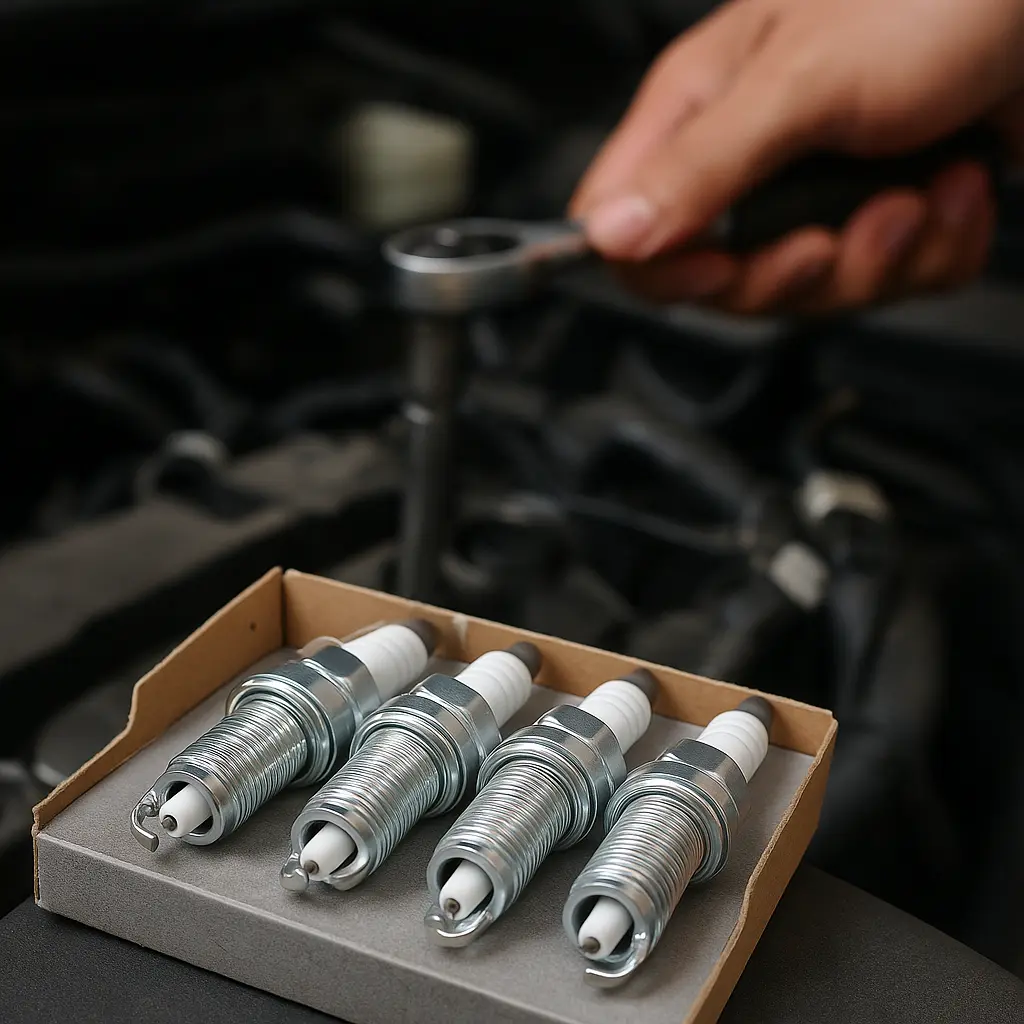How Much Does Spark Plugs Replacement Cost in 2025?
The average spark plugs replacement cost in the UK ranges from £40 to £150 depending on vehicle type, garage rates, and the number of spark plugs required.
Understanding the spark plugs replacement cost in the UK is essential for vehicle owners aiming to maintain engine efficiency and avoid breakdowns. This guide breaks down everything you need to know about pricing, inclusions, and savings in 2025.
Average Spark Plugs Replacement Cost in the UK
The spark plugs cost in the UK can vary based on several factors, such as car make and model, the type of spark plugs used, and whether you use a main dealer or an independent garage. Labour rates across regions also impact pricing, with London and the South East typically charging more than the North or rural areas.
Here’s a detailed breakdown of typical spark plugs replacement costs across different scenarios:
| Vehicle Type | Service Provider | Average Cost (2025) |
|---|---|---|
| Standard Petrol Car | Independent Garage | £45 – £90 |
| Luxury or Sports Car | Specialist Mechanic | £90 – £150 |
| Hybrid Vehicle | Main Dealer | £100 – £140 |
| Diesel Car (Glow Plugs) | Franchise Garage | £80 – £130 |
Real UK Garage Prices — Correct as of 9th July 2025
| Location | Average Price | Garage / Source |
|---|---|---|
| National (Bumper.co.uk) | £50–£300 | Bumper |
| UK Average (FixMyCar) | £100–£250 (avg £152.14) | FixMyCar |
| England (ClickMechanic cities) | £55–£125 (avg £85) | ClickMechanic |
| Scotland (Glasgow, FixMyCar) | £97–£113 (£~105) | ClickMechanic (city data) |
| Forum quote (r/CarTalkUK) | ~£125 + £75 labour | Reddit quote |
These prices vary by location, vehicle type, and plug material. Always check with a local garage for precise rates.
What’s Included in Spark Plug Replacement?
- Inspection and testing of old spark plugs to assess wear and fouling
- Safe removal of each spark plug using a torque wrench and socket
- Fitting of new spark plugs matched to your engine specifications
- Adjustment of plug gaps and proper torque settings for optimal ignition
- Basic check of ignition coils, wires, and connectors
- Engine diagnostics using OBD tools (in some garages)
- Labour, usually charged at 30–60 minutes for most cars
How to Save Money on Spark Plug Replacement
- Use independent garages which typically offer lower hourly rates than main dealers
- Purchase your own spark plugs online from reputable suppliers to avoid garage markups
- Schedule spark plug replacement alongside major servicing to reduce overall labour costs
- Ask for written quotes from multiple garages and negotiate where possible
- Check for vouchers or service plan discounts through motoring clubs like RAC or AA
- Maintain your engine health with regular servicing to extend the lifespan of your plugs
Frequently Asked Questions
How often should spark plugs be replaced?
Spark plugs should generally be replaced every 30,000 to 60,000 miles, depending on the vehicle and spark plug type. High-performance or long-life spark plugs made from iridium or platinum can last up to 100,000 miles. However, environmental factors such as driving habits, fuel quality, and engine condition can influence the interval. It’s advisable to follow the schedule outlined in your vehicle’s owner manual or consult with a certified mechanic during routine servicing.
Can I change spark plugs myself?
Yes, replacing spark plugs is considered a moderately simple DIY task for those comfortable with basic engine work. You’ll need a socket wrench, a spark plug socket, a gap gauge, and potentially a torque wrench. Be sure to disconnect the battery, remove spark plug wires carefully, and install new plugs with correct torque to avoid engine damage. DIY replacement can save between £40–£80 in labour, but it’s crucial to use manufacturer-recommended spark plugs to avoid performance issues or warranty voids.
What are the signs of bad spark plugs?
Signs of worn or faulty spark plugs include engine misfires, reduced fuel economy, poor throttle response, and a rough idle. You might also notice the check engine light turning on or the car struggling to start. Ignoring these symptoms can lead to long-term engine damage and higher repair costs. Regular spark plug inspections can catch issues early, especially if the engine feels sluggish or the vehicle fails an emissions test.
Is it necessary to replace all spark plugs at once?
Yes, replacing all spark plugs in one go ensures uniform engine firing and optimal combustion. Mixing old and new spark plugs can lead to uneven performance, misfires, and potential long-term engine stress. Most vehicles have 4, 6, or 8 spark plugs depending on the number of cylinders, and mechanics typically quote prices for replacing the full set. Replacing them all together also ensures that the maintenance interval restarts fresh for the entire ignition system.
Do diesel cars have spark plugs?
No, diesel engines use glow plugs instead of spark plugs. While spark plugs create a spark to ignite the fuel-air mixture in petrol engines, glow plugs preheat the combustion chamber to aid cold starts in diesel engines. Though similar in concept, their roles and maintenance schedules are different. Glow plugs also tend to be more robust, but they can fail and require replacement, with costs similar to or slightly higher than petrol spark plug replacement.
How much does spark plug replacement cost for a BMW or Audi?
Premium car brands like BMW, Audi, or Mercedes often have higher spark plug replacement costs due to labour complexity, parts quality, and engine layout. On average, expect to pay between £100 and £150, especially if your vehicle uses 6 or 8 spark plugs. These models may also require specialist diagnostics and tools, making independent specialists or franchise garages a more cost-effective alternative to main dealers. Always ensure your service provider uses OEM or equivalent-quality parts to maintain vehicle performance and warranty compliance.
Are expensive spark plugs worth it?
Yes, in many cases, premium spark plugs like those made from iridium or platinum are worth the investment. They last significantly longer—up to 100,000 miles—compared to standard copper plugs that might only reach 30,000 miles. Moreover, they offer better combustion efficiency, which can improve fuel economy, reduce emissions, and enhance acceleration. While they cost more upfront (about £10–£20 per plug), the long-term savings on replacements and better engine performance make them a smart choice for most car owners, especially those driving high-mileage or performance vehicles.

Want to DIY? Watch :
Other Relevant Articles
How much does an oil change cost in the UK?
If your spark plugs are fouled or misfiring, it may be due to poor engine lubrication — an overdue oil change could be a contributing factor.
How much does an EGR valve replacement cost in the UK?
Issues with the EGR valve can impact combustion efficiency and lead to premature spark plug wear.
How much does car battery replacement cost in the UK?
A weak battery can cause incomplete ignition cycles, making it harder to identify whether spark plugs or power supply is the issue.
